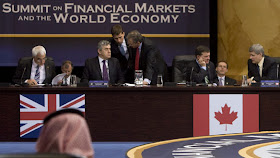Here is the interview:
Comment: James Miraflor of Freedom from Debt coalition in Manila

Prime Minister Stephen Harper, right, chats with his Finance Minister Jim Flaherty as Britain's Prime Minister Gordon Brown chats with aides prior to Saturday's start of the G-20 summit on the world economy in Washington. (Tom Hanson/Canadian Press)
Here is the article:
World financial crisis
Finance summit to discuss boosting world economy
http://www.radiofranceinternationale.fr/actuen/articles/107/article_2147.asp
Article published on the 2008-11-15
Latest update 2008-11-15 15:24 TU
Sarkozy (L) Bush (C) and Barroso at the White House
(Photo: Reuters)
Leaders of the G20 group of the world's dominant economies meet in Washington on Saturday to discuss how to tackle the world economic crisis. They are expected to commit themselves to stimulate their economies and tighten up financial regulation but discussions are expected to continue for several months.
